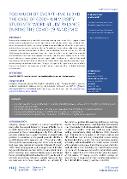Too much of everything is bad: The case of Czech university students' work-study balance during the Covid-19 pandemic

Publication date
2025Published in
Journal on Efficiency and Responsibility in Education and ScienceVolume / Issue
18 (2)ISBN / ISSN
ISSN: 2336-2375ISBN / ISSN
eISSN: 1803-1617Metadata
Show full item recordCollections
This publication has a published version with DOI 10.7160/eriesj.2025.180205
Abstract
Students are an exceptionally vulnerable population in comparison to any other age group. Manystudents face considerable stress stemming from the combined demands of their studies and, for some,the necessity to work. This situation presents a serious dilemma of how to combine work and studyhow to maintain mental well-being. We explored the work-study balance through an analysis of arepeated cross-sectional sample of 8,584 Czech university students in two time points (2020 and 2021)during the pandemic outbreak. Employment benefits students' mental health, but students who workedextra hours had more depressive symptoms than those who worked part-time or full-time. In addition,an increasing study load had a negative effect on students in the form of increased depressivesymptoms. Both students who were employed before the pandemic but were no longer working duringit and students who never had a job had significantly higher depressive symptoms than workingstudents. The expectation of a detrimental high workload-high study load effect was not confirmed.
Keywords
Covid-19, CES-D 8, role enrichment, role overload, study, university students, work
Permanent link
https://hdl.handle.net/20.500.14178/3128License
Full text of this result is licensed under: Creative Commons Uveďte původ 4.0 International


